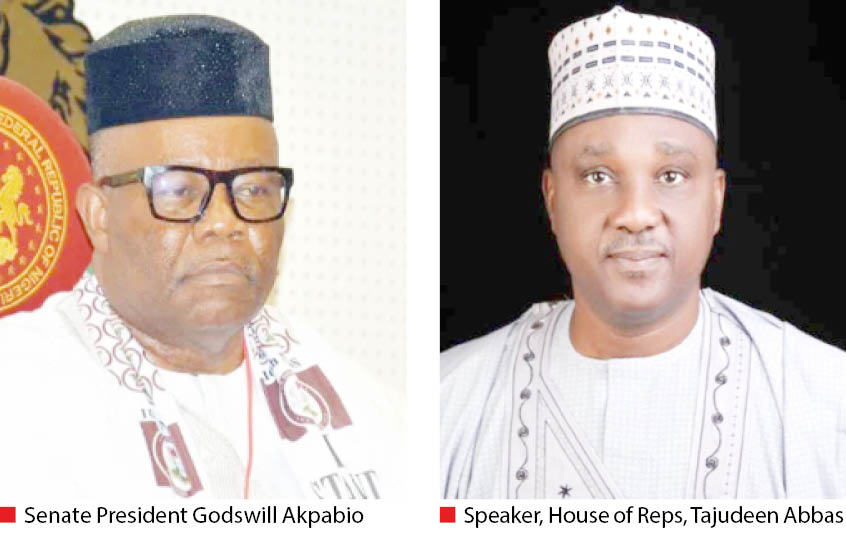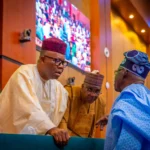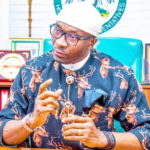The House of Representatives Speaker, Tajudeen Abbas, on Thursday, unveiled the chairmen of standing committees, putting an end to the intense lobbying for the chairmanship of ‘juicy’ panels by members of parliament.
This came six weeks after the inauguration of the 10th National Assembly on June 13 and four weeks after the emergence of principal officers in both chambers.
In the Red Chamber, Senate President Godswill Akpabio had earlier this month announced the chairs of 9 committees. More than 60 others are expected to be named in the next few days.
In a move to reward the overwhelming support and votes he got from both the ruling and opposition lawmakers during the leadership race, the Speaker jerked up the number of the committees from 105 to 134.
- Ogun: Thugs disrupted voting in 99 units, Adebutu tells tribunal
- Drug abuse, cultism fuel insecurity in Lagos communities
A few days before the election of presiding officers, several contenders withdrew from the race and declared support for Abbas and his deputy, Benjamin Kalu.
The June 13 speakership election witnessed three contestants, but Abbas, the All Progressives Congress (APC)-endorsed candidate, polled 353 votes to defeat Ahmed Wase and Sani Jaji, who polled three votes each.
Alhassan Ado Doguwa, Yusuf Adamu Gagdi and Mukhtar Betara and other aspirants that stepped down for Abbas and members that worked for his victory were named chairmen of top-grade committees.
Doguwa, Betara and Gagdi chair committees on Petroleum Resources (Upstream), Federal Capital Territory (FCT) and Navy respectively.
Ikenga Ugochinyere emerged as the chairman, Petroleum Resources (Downstream); Peter Akpatason, Aviation; Kabir Alhassan Rurum, Air Force; Abdulmumini Jibrin, Foreign Affairs.
Abubakar Kabir Abubakar Bichi is now the head of Appropriations Committee, Leke Abejide and James Faleke retained their chairmanship of committees on Customs and finance respectively.
Lawmakers who are the offspring of highly-exposed political figures were also not left out.
Mohammed Bello, son of the immediate past governor of Kaduna State, Nasir el-Rufa’i, was named the chairman, Committee on Banking, while Erhiatake Ibori-Suenu, the daughter of a former Delta State governor, James Ibori, got the Committee on Niger Delta Development Commission (NDDC).
Committees’ functions
In the exercise of legislative functions, the National Assembly works in smaller units known as committees, which are created in line with the existing mandate of ministries, departments and agencies of government.
The functions of committees are spelt out in the constitution and in the rules of each House.
These committees carry out the various oversight and special functions as specified by law, including investigating government policies, reviewing and approving budget, consideration of bills and probe of alleged infractions by government agencies, and recommend appropriate sanctions where laws are violated.
Section 62(1) of the 1999 Constitution empowers the National Assembly to create committees of its members and delegate functions, which the National Assembly has powers to exercise to such committees; direct any of its committees to investigate any matter or thing over which it has powers to make laws; and to investigate the conduct of any authority charged with the responsibility of administering laws or disbursing money appropriated by the National Assembly.
Further, section 89 of the constitution empowers National Assembly committees to procure evidence and examine witnesses; require such evidence to be given on oath; summon any person in Nigeria to give evidence or produce a document, and issue a warrant to compel the attendance of any person who fails or refuses to appear.
Worries over bloated committees, overlapping functions
There are concerns over the rising number of National Assembly committees every legislative session, which analysts said were created for political patronage over legislative effectiveness and productivity.
This, they said, was evident in the poor oversight of government agencies.
The African Parliamentary Advocacy and Reform Group (APARG), a civil society organisation, described the increase of House committees as outrageous and counterproductive.
The group’s director, Chibuzo Okereke, in a letter to the Speaker, stated that rather than increasing the number of standing committees, they should be cut down to about 60 to ensure effectiveness and productivity in the oversight legislative functions.
He stated, “The trends in political decisions to progressively increase the quantity of the standing committees rather than their quality have resulted in a serious decline in legislative assertiveness, effectiveness, productivity and value for money in public service delivery, arising from weak oversight, low participation of members in the numerous perceived low-grade committees, conflicts in the exercise of legislative oversight powers on executive agencies, distress on the limited infrastructure for committee meetings and continuous low perception of citizens on the significance of the governance role of the National Assembly to Nigerians.”
He further stated that due to the scare resources of the National Assembly, most of the committees stood the risk of relying solely on the executive, ministries, departments and agencies, which they are supposed to oversight, thus, leaving room for compromise in the discharge of their legislative duties.
“Accordingly, the excessive fragmentation and proliferation of the committee system without consideration of the important principles of robustness and effectiveness weaken the House of Representatives, and it is akin to giving birth to a baby and throwing it away to fight for survival alone.
“An empirical analysis of the 109 standing committees of the 9th House of Representatives shows that several of the committees did not hold any meeting nor perform any significant legislative activity under their committees throughout the lifespan of the Assembly, while some of them held meetings only for few times in the entire four years.
“It is for the above reasons and more that we write this open letter as citizens, legislative advocates and experts, to urge the Speaker and the leadership to intervene and change the tide in the trends of proliferation and excessive fragmentation of the committee system in the 10th House of Representatives to help engender an effective and productive oversight system and improve the image and perception of the National Assembly,” he stated.
Assignments pile up for committees
While the composition of the membership of all the 134 House committees is yet to be done, dozens of resolutions have been referred to the panels for further legislative work. Same scenario also played out in the Senate, which has not unveiled its committees’ chairmen and members.
Such resolutions called for government’s attention on matters of security, poor infrastructure, economy, as well as investigation of others.
Among them are the probe of N6.5billion shoreline protection contract awarded by the Niger Delta Development Commission in Ondo State in 2006; payments made as oil subsidy and under-recovery by the former President Muhammadu Buhari government, airport concession, and allegations of bribery and corruption against officials of the Integrated Payroll and Personnel Information System (IPPIS) at various universities across the federation.
In the absence of standing committees, issues requiring urgent attention are often referred to ad hoc committees, which function is limited to the purpose for which it is created.
More than five different ad hoc panels are currently investigating one issue or another in both chambers, including alleged abuse of firearms by Customs officers in Katsina border towns, increase in fuel price and adulterated aviation fuel.
While the assignments continue to pile up for the committees, the lawmakers, however, said they were ready for the job.
“There is nothing like having too much work for the standing committees. The House is ready for the challenges ahead. That is the work we were elected to do, and it has always been a continuous process. The TV committees will commence working on what was referred to them in earnest,” the chairperson, Ad-hoc Committee on Media and Public Affairs, Khadija Bukar Abba Ibrahim told Daily Trust Saturday.
It remains to be seen if the investigations would end up like previous ones, which findings and recommendations held little or no hope of the indicted being brought to book.
‘How committee chairmen were picked’
In a remark on Tuesday, Abbas said the selection of chairmen and deputy chairmen of the standing committees were based on competence and other criteria used by the selection committee, which he chaired.
He said, “The selection committee relied on the capacities, experiences, knowledge, competencies, skills and legislative interests of members in assigning colleagues to different committees.
“We did this to ensure that we have round pegs in round holes. Indeed, we had to cope with the onerous task of assigning members to the different committees on the basis of the criteria listed earlier.
“You would recall that the leadership of the House has consistently assured members of its resolve to be fair to all, irrespective of political leanings and affiliations.
“There are no grade ‘A’ nor the so-called ‘juicy committees’ as some erroneously often think. Every committee of the House enjoys equal status, powers and privileges as mere working groups to discharge the mandate given to us by our constituents.”
The Speaker directed that chairmen of the standing committees must submit regular reports of their activities to the leadership of the House in order to ensure diligence.
He said, “All committees are now required to submit regular reports of their activities to the leadership of the House on a quarterly basis. Investigative hearings, public hearings and reports from oversight functions have to be submitted to the House in plenary for further legislative action.
“I, therefore, charge you to be guided by these principles, even as we embark on the oversight of other arms of government. We must see the powers of oversight given to us by the constitution as a means to promote good governance through compliance to the laws of the land.”
Abdullateef Salau, Balarabe Alkassim & Itodo Daniel Sule

 Join Daily Trust WhatsApp Community For Quick Access To News and Happenings Around You.
Join Daily Trust WhatsApp Community For Quick Access To News and Happenings Around You.


